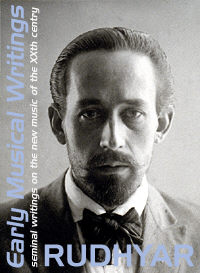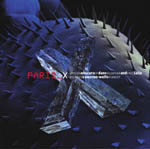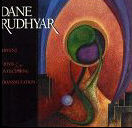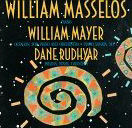 |
| Home | Bio | Art | Music | Literature | Civilization & Culture | Philosophy of Wholeness | Theosophy & Spirituality | Astrology |

DJANE LAVOIE-HERZ
and Her Work D. Rudhyar The Musical Observer March 1926 Djane Lavoie-Herz was one of the foremost piano teachers of the first half of the 20th Century. Born in Ottawa, Canada in 1889, Djane was a student and devotee of Russian composer Alexander Scriabin. Soon after arriving in North America, Rudhyar stayed for a time in the Toronto home of Djane and her husband, Siefried. There he begin to study Blavatsky’s The Secret Doctrine. Djane and Siegfried soon moved to New York City, and later to Chicago, where Djane conducted a well-known salon. During this era Djane was the piano instructor to the first American woman composer, Ruth Crawford-Seeger, whose work and philosophy were profoundly influenced by Rudhyar, and to Vivian Fine. The Early Musical Writings of Dane Rudhyar are made available for students of musical history and for scholarly research. Rudhyar was concerned that composers, students and scholars should not regard his earliest writings and articles - written while he was still a young man - as his most significant literary contributions to music. The reader is referred to Rudhyar's book The Magic of Tone and the articles The Transforming Power of Tone and When Does Sound Become Music for his mature and fully developed contributions. |
|
Related Articles |
|
Archived Music Articles |
|
|
Also Available Online |
|
» Rudhyar's Integration of Experience and Concepts - Music, from Leyla Raël's The Essential Rudhyar. |
|
Available Offsite |
|
Musical Works |
|
Musical Scores |
|
For scores of Rudhyar's musical works, visit the site of the American Composers Alliance. Musical scores 5 Stanzas and Granites are also available from SheetMusicPlus.com |
|
Also of Interest |

The Music of Rudhyar & Satie PARIS-X Musica Obscura Richard Cameron-Wolfe, Piano. Hear a sound clip 
Piano and String Compositions AVENT, CRISIS & OVERCOMING, TRANSMUTATIONS Marcia Mikulak, Piano and The Kronos Quartet 
An Earlier Recording of Rudhyar's Music Now on CD MASSELOS PLAYS RUDHYAR |
|
Home » Music » Articles on Music  According to the ancient Hindu tradition there is no human activity more sacred and more honored than that of the teacher. The mother is the progenitor of the physical body of the child, it is true. But the teacher it is who develops the mentality of the youth; he is the mother of ideas, and, if he be spiritual teacher, he is the mother of the soul of his disciple or "chela." In other words while the mother builds the material body of her son out of her flesh and blood, the real teacher builds the inner body of his disciple out of the very fiber of his spiritual love and of his own cultural knowledge. Thus the relation of teacher to disciple is a sacred relationship, as deep and as lasting, and perhaps even more real, than the relation of mother to child, as the realm of mind reaches further than the realm of the physical. In money-mad America, where everything is to be bought, teachers also have to be paid for; and the higher the price the more marvelous the teachings are expected to be. But spiritual values cannot be paid for in money, whereas technical advices can easily be bought as they belong to the world of material things. Teaching that recognizes spiritual values creates life; goes to the roots of culture, of music, to the source of interpretation. Ordinary teaching hands down intellectual or physical facts and then considers its work achieved. It is at best formal, often mechanical. To teach music as life, in the way a mother guides her young child and feeds his growth, to teach by rousing the flame of creative power within the pupil, by exalting the god within and forcing him to grow beyond his own limitations and the dead weight of traditions, racial or otherwise; to teach by the example of an unselfish and sacrificing life devoted to Art as to a religion; to teach not as an autocrat forcing a type of interpretation upon an inert pupil but by forcing the pupil to become soul-conscious and free, self-reliant; is the highest function of the teacher. Djane Lavoie-Herz is such a teacher. Born in French Canada, she soon left for Europe, studied music for a while under the guidance of her compatriot Alfred Lalibertè, was an intimate in the circle of great minds who for a while gathered in Brussels around men like Scriabin and Jean Delvaillc, studied philosophy, metaphysics, oriental lore and became thoroughly impregnated with the highest which European culture could offer. Then she came back to Canada; after her marriage she settled for a few years in Toronto, where she began teaching. As she tried to give out knowledge she began to realize how little assured and superficial the ordinary approach to music and piano-playing was. She met avid souls of pupils eager to grow, and what could she offer them? Mere traditions would not feed them. So with rare spiritual and esthetic honesty she began studying again, alone; she began to go to the roots of things, questioning all systems of playing, all types of techniques. She tried them all on herself, watching results, disappointed mostly, yet here and there finding seeds of genuine truths which waited only to be developed and coherently systematized. She experimented. She lived, allowing nothing vital in the sphere of art and culture to escape her. She helped others. Then she felt herself ready to go to a wider field of work, to give the result of those struggling and in some ways, arid years. She moved to Chicago where she has been teaching ever since. This was about six years ago. Now she has more pupils than she can take care of and what is infinitely more important her influence has radiated so much that a splendid cultural nucleus has been forming around her, and that most talented youths are ceaselessly coming to her for guidance. We spoke of the real higher relationship of teacher to disciple as understood in the East. Such is exemplified in her relation to her greatest pupil, now a pianist of national repute, Gitta Gradova. To her Djane Lavoie-Herz devoted much of her own life-energies; for in her she found a most wonderful germ ready to burst forth into a marvelous growth, as soon as real care would be bestowed upon her. Patiently, lovingly, in the real spirit of giving, she taught the eager youth not only piano, but music, culture, life. And now Gitta Gradova is able to bear forth the message, to spread the good news of an art based on life, of interpretations born out of the heart, quickened by the very warmth of ideals lived by and realized. Others are following. Three or four young students now in their teens, are ready to blaze forth as real interpreters and perhaps creators, when the proper time of their maturity comes. A few weeks ago one of the most promising, Rose Neistein, gave her first recital in Chicago and scored a splendid success. Highly sensitive with a pure openness of heart and a remarkable delicacy of feeling for her years, this newcomer promises to go very far. The important thing is that here in Djane Lavoie-Herz' work and radiation one can feel a little fountain of life, of vibrant life. Music has become so stifled by materialistic valuations nowadays, by a false idea of technical perfection which kills the spirit in order to refine endlessly the surface; music has become so thoroughly hypnotized by the fallacy of going back to classicism and the Seventeenth century, by the notion that musical works are decorative patterns, "pure forms"; piano-playing has become so cold, so sterilized by the slavish adherence to score which pretends to rule over the very life-throbs of the interpreter degraded into a sort of executive machine — that one welcomes with unbounded joy the presence of a center of real artistic emanations, where human beings realize themselves as interpreters of life through music, instead of mere virtuosi, where a teacher, conscious of her higher duties and prerogatives lives by such a realization, and thus helps others to be born and to give.  Home | About | Calendar | Ephemeris Charts | Art Gallery | Library | Resources Shop | Links | Rudhyar Archival Project | Help Web design and all data, text and graphics appearing on this site are protected by US and International Copyright and are not to be reproduced, distributed, circulated, offered for sale, or given away, in any form, by any means, electronic or conventional. See Notices for full copyright statement and conditions of use. Web design copyright © 2000-2004 by Michael R. Meyer. All Rights Reserved. |